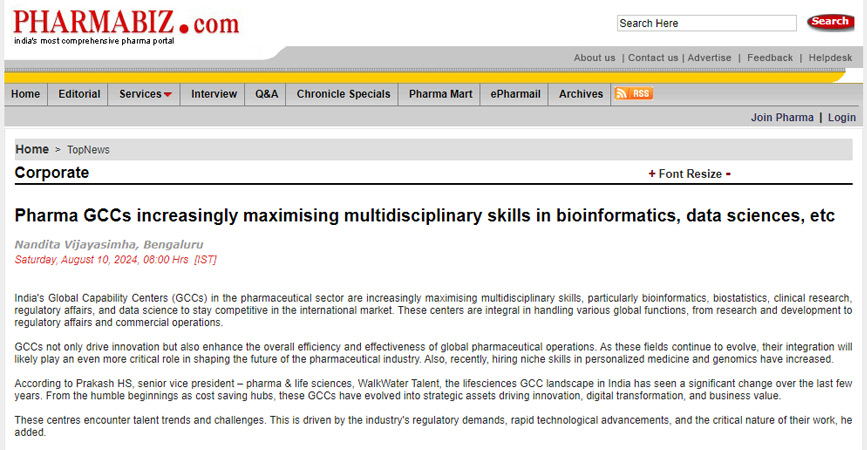
India’s Global Capability Centers (GCCs) in the pharmaceutical sector are increasingly maximising multidisciplinary skills, particularly bioinformatics, biostatistics, clinical research, regulatory affairs, and data science to stay competitive in the international market. These centers are integral in handling various global functions, from research and development to regulatory affairs and commercial operations.
GCCs not only drive innovation but also enhance the overall efficiency and effectiveness of global pharmaceutical operations. As these fields continue to evolve, their integration will likely play an even more critical role in shaping the future of the pharmaceutical industry. Also, recently, hiring niche skills in personalized medicine and genomics have increased.
According to Prakash HS, senior vice president – pharma & life sciences, WalkWater Talent, the lifesciences GCC landscape in India has seen a significant change over the last few years. From the humble beginnings as cost saving hubs, these GCCs have evolved into strategic assets driving innovation, digital transformation, and business value.
These centres encounter talent trends and challenges. This is driven by the industry’s regulatory demands, rapid technological advancements, and the critical nature of their work, he added.
For instance, recently Sanofi, which is in the process of expanding its GCC at Hyderabad, is planning to hire talent across R&D, commercial, manufacturing, supply chain, digital to corporate functions. Similarly we see a trend towards interdisciplinary collaboration, integrating expertise from biology, chemistry, data science, and engineering functions, Prakash told Pharmabiz.
There is a digital transformation across GCCs which are extensively investing in artificial intelligence, machine learning, blockchain, and big data analytics. Even AstraZeneca GCC at Chennai has expanded its focus with enterprise platforms, artificial intelligence, machine learning, data science, and supply chain analytics. To this end, WalkWater Talent has listed some of the key trends and challenges in hiring and retaining talent in Lifesciences GCCs which spread across Bengaluru, contributing over 30% of India’s GCC units, followed by Hyderabad and Mumbai, he said.
In most of the pharma GCCs, diversity and inclusion is a priority. This agenda is driven by the HR to promote gender diversity, cultural inclusivity, and equal opportunities. This trend is gaining momentum across other industry GCCs as well.
While pharma GCCs are rapidly expanding in India, securing and retaining niche talent, creating a pipeline of readily available talent with new emerging skills, and fostering talent for global leadership roles continue to face significant challenges.
There is an imminent paucity of professionals in pharma GCCs with the necessary scientific and technical expertise. There is immense competition for top talent particularly for roles requiring advanced degrees and specialized knowledge. Moreover, GCCs are largely concentrated in few cities which poses the challenge of retaining the talent. For example, Bengaluru accounts for maximum GCCs in pharma compared to other cities with Teva, Alcon, Novo Nordisk, GSK, Merck etc. Being competitive nature of the industry and the lure of opportunities in these companies, make talent retention a big question.
Being part of MNCs, integrating the culture and operations of GCCs with their parent organization, especially in global setups, can be challenging. Many of the pharma GCCs offer flexibility and has hybrid working models. While remote work offers flexibility, it also poses challenges in terms of maintaining team cohesion, monitoring performance, and ensuring data security, said Prakash.
Source: PharmaBIZ








